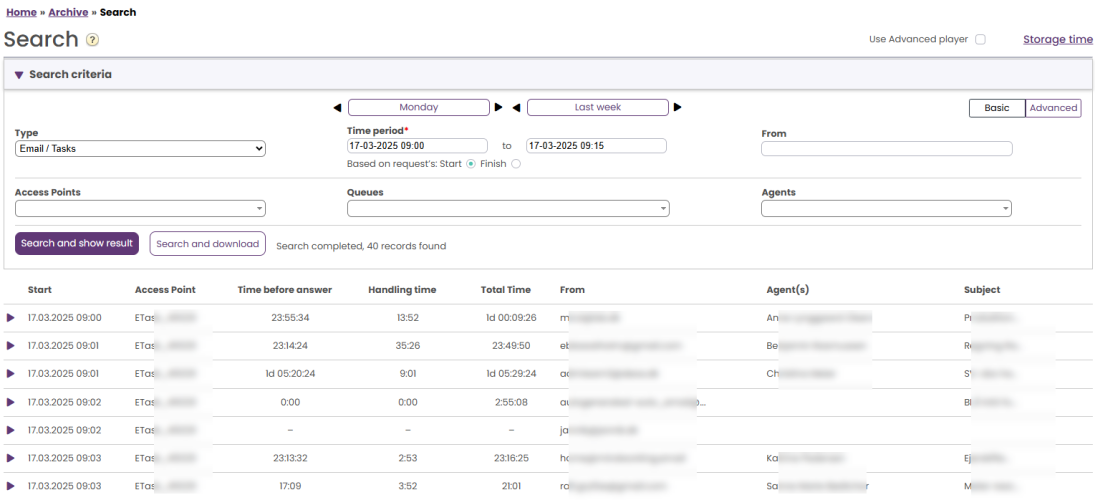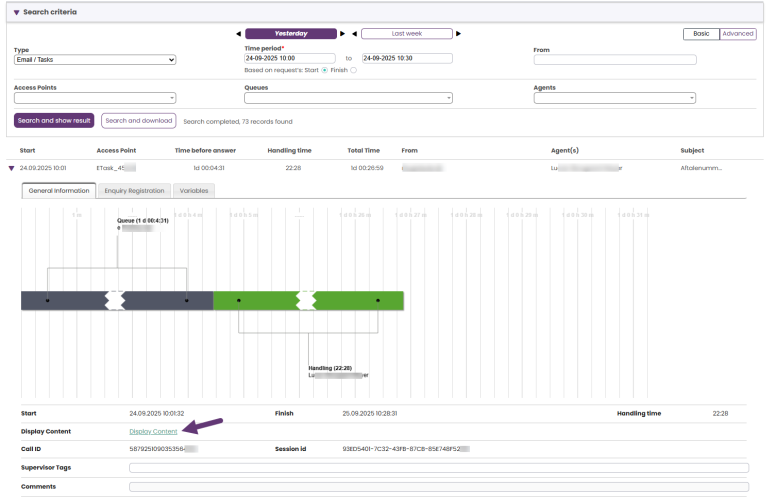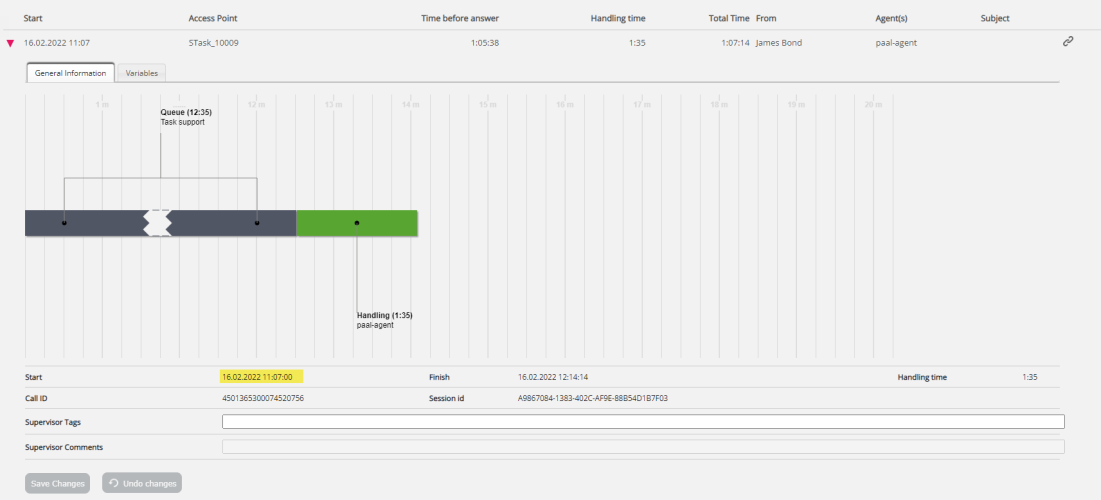Search results for Email/tasks
In Archive, type "Email/Task" covers requests with media type Email.
Media type email is used for ordinary emails, written requests from any system queued in and distributed by Puzzel Contact Centre, including Puzzel Case Management Tickets (often called Task or eTask) and by Scheduled tasks.
Emails/tasks usually have a duration (from request arrived in queue until agent closed the request tab) of several days. If you know when the request you search for arrived in queue, you should search based on request's Start, but if you only know when the email/task was answered by the agent, you should search based on request's Finish.
When an email/task request arrives in the Puzzel Contact Centre solution, an ‘arrival-record’ (called Pre-initiation event in Raw data) is generated, and the request appears in the Archive with Start, To (Access point), From and possibly Subject. If you use Advanced search, you can choose Answer status = Not yet answered or Answered instead of All, which is default.
Information about time spent in queue and which agent that answered is available first after the email request handling in Puzzel is finished and the complete raw data is available.
- ‘Time before answer’ is the time from email arrival in queue until the first agent accepts it. This is similar to wait time in statistics report Details per queue for email and social media.
- ‘Handling time’ is time from the agent clicks accept until he/she clicks ‘finish’.
- ‘Total time’ is from the email arrived in Puzzel queue until the last agent has clicked finish.
Below the graph, you'll find a Display content link, which is a link to the actual email (task) stored in your local system or in Puzzel Case Management. This is the link Puzzel received when the email was put in queue. (This link is not used for Scheduled tasks). Please note that if the email/task is moved to another folder in the source system, the link may no longer be valid.
For email requests in Archive representing Puzzel Case Management tickets/emails, we usually show several variables in Archive, including Ticket reference.
If the agent that accepted the email/task transfers it to another agent or queue, the time before next agents answers is shown as time in (a new) queue. If the agent puts the email in his/her personal queue and then answers it later, this is shown as time in personal queue and then a new Handling time.
Why so many Emails in Archive without any agent name?
If agents assign Tickets from Case Management to themselves (instead of getting them assigned from queue) and you have not yet turned on Enhanced 'Ticket Handling' in Puzzel Contact Center, PCM will delete the PCC request from queue, and there will be no Conversation event in Archive nor in Raw data for the time the agent spent working on the ticket.
Scheduled tasks in Archive
A Scheduled task created by an Puzzel agent or using the API is usually shown with access point = "STask_<customer number>", e.g. "STask_10009", and with From = Contact name. A scheduled task will appear with very limited information in Archive some minutes after its created (as an email received but not yet answered). The one below is created at 16.02.2022 at 11:07 (=Start time) and it has a value for From, but no other information before it's answered and closed by agent.
When a scheduled task is finalised by agent (hours or days later), the rest of the information about the scheduled task will appear in Archive in the General information tab.
Please note that the queue event starts at the Scheduled time (in this case at 12:00 local time), which is not the same as the request's Start, which might be hours or days earlier. The queue event's duration (here 12m 35s) is until agent has accepted the task. The actual scheduled time can be found in the Variables tab.
If you want to search for a Scheduled task, you should search based on request's Finish, since a Scheduled task might have been created (=having Start) many days before the scheduled time/when it was sent to agent.
Time before answer is from the scheduled task was created (Start) until agent accepted, and Total time is from when scheduled task was created until agent closed the request tab in the agent application (=Finish). Since it may be several days between a scheduled task was created (Start) until its Scheduled time, these 2 parameters are not very useful for Scheduled tasks.
Variables tab
- Here you find the scheduled task input parameters like scheduled time, subject, contact id, phone number and URL.
- The scheduled time (api_etask_scheduled_datetime) is in UTC and not in local time.
Call_id and session_id shown for email/task/scheduled tasks in Archive:
- When we only have the pre-initiation event available (the email request is still in queue or being handled by an agent who has not yet closed the request tab in agent application), we show the same call_id in Archive as the one that appears in Raw data, but we do not show a session_id at this stage.
- When we have the complete email raw data available (after the email request is answered and ended by agent), we show another call_id in Archive (not present in Raw data) and we now show the email's 'main' session_id (which is also shown in Raw data).





